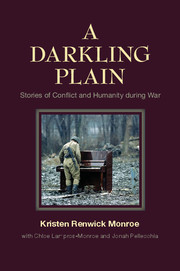Book contents
- Frontmatter
- Epigraph
- Contents
- Preface
- Introduction
- Part one War is a Terrible Thing!
- Part Two Guarding One’s Humanity During War: World War II
- Part Three Other Voices, Other Wars: From Indochina to Iraq
- Part Four Civil Wars and Genocides, Dictators and Domestic Oppressors
- Part Five My Story, Your Choice How to Use it
- Conclusion
- Bibliography
- Acknowledgments by the Senior Author
- Index
- References
Introduction
The human aspect of living through a war
Published online by Cambridge University Press: 05 October 2014
- Frontmatter
- Epigraph
- Contents
- Preface
- Introduction
- Part one War is a Terrible Thing!
- Part Two Guarding One’s Humanity During War: World War II
- Part Three Other Voices, Other Wars: From Indochina to Iraq
- Part Four Civil Wars and Genocides, Dictators and Domestic Oppressors
- Part Five My Story, Your Choice How to Use it
- Conclusion
- Bibliography
- Acknowledgments by the Senior Author
- Index
- References
Summary
An opportunity to think more systematically about how people keep their humanity during war occurred in the fall of 2010 when I taught a course on psychology and international politics. I had just finished a book on the psychology of genocide and was interested in seeing how the book manuscript played when I taught it. But I also wanted to explore a slightly different aspect of the problem, wanted to understand and show students how people keep their humanity during genocide and war and how they reclaim it later in life. Uncertain what to call this course, in a rash moment I dubbed it “Ethics in a time of terror and genocide,” ordered the books, and promptly forgot about the course until the late summer, when I wandered into the Department office and asked the Departmental Secretary if any of the books had arrived.
“Sure. They’re over there.”
“Thanks,” I said, as I turned to the shelf where desk copies were stored.
“Do you want to get the books for your TA, too?” Natalie asked.
- Type
- Chapter
- Information
- A Darkling PlainStories of Conflict and Humanity during War, pp. 1 - 8Publisher: Cambridge University PressPrint publication year: 2014



